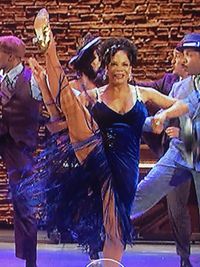Are all straight plays performed in a Broadway house unmiked?
broadwayguy91
Broadway Star Joined: 12/23/15
#1Are all straight plays performed in a Broadway house unmiked?
Posted: 7/10/16 at 4:45am
Just curious to know. Especially for straight plays where there are only rare instances of music / no music.
#2Are all straight plays performed in a Broadway house unmiked?
Posted: 7/10/16 at 9:23am
No, they quite often have floor-mics, and sometimes even body-mics.
#3Are all straight plays performed in a Broadway house unmiked?
Posted: 7/10/16 at 9:45am
Some straight plays are so undermiked that they could very well pass as unmiked.
#4Are all straight plays performed in a Broadway house unmiked?
Posted: 7/10/16 at 10:43am
The most recent play I can recall seeing on Broadway without any apparent use of mics was No Man's Land with Patrick Stewart and Ian McKellan in 2014.
It's possible they were using floor mics but you would never know it from how hard everyone in the audience was struggling to make out the lines.
#5Are all straight plays performed in a Broadway house unmiked?
Posted: 7/10/16 at 11:24am
every show has some sort of mics unless they forego assisted listening devices. Also depending on the set up, crew may need it in their headphones. Neither means that they have to have any speakers or that those speakers are effective for everyone. Hearing, hearing aids and assisted listening devices are sensitive subjects.
candydog2
Featured Actor Joined: 8/11/07
#6Are all straight plays performed in a Broadway house unmiked?
Posted: 7/10/16 at 11:31am
All the old-fashioned theatre puritans seem to like their plays unmiked. "A real actor can project to the back of the auditorium" etc etc.
I am not of this mindset at all. Unless it is a genuine artistic choice or totally unnecessary I see no reason why there should be no technological aid for the actors when it comes to having microphones. They still have to play outwards to the audience, they just don't have to strain their voices in order to do it.
When I saw Blithe Spirit in London it was clear that all of the cast were unmiked except for Angela Lansbury. Yes, for me the cast could be heard clearly, but I can't speak for those in the back row who perhaps did not catch every word. And without a microphone I'm sure Lansbury's performance would not have been as enjoyable, or even possible to an extent.
dev101
Featured Actor Joined: 8/31/14
#7Are all straight plays performed in a Broadway house unmiked?
Posted: 7/10/16 at 12:03pm
When I saw Elephant Man with Bradley Cooper I'm fairly sure it was unmiked The booth is also such a small theater, so it wasn't really necessary to have mics and speakers
#8Are all straight plays performed in a Broadway house unmiked?
Posted: 7/10/16 at 3:44pm
Two decades ago I heard composer David Shire talk about how we are conditioned to expect electronic amplification by TV, movies, CDs (in those days), etc. He argued that so-called "natural" sound no longer seems natural to our ears. I think he's right, in most cases.
* I put "natural" in quotes above because projecting to the rear wall of a theater is no more natural than using a mike. It may not be mechanically amplified, but it is hardly everyday speech.
I think Shire was too polite to say it, but a case can also be made that most of us have forgotten how to listen carefully enough to hear stage dialogue that isn't electronically amplified. It does occur to me that a lot of today's bad behavior (see that long thread) might not have occurred when everyone was listening intently to hear unmiked actors. But objecting to electronic amplification nowadays is pushing the river, I'm afraid.
#9Are all straight plays performed in a Broadway house unmiked?
Posted: 7/10/16 at 4:19pm
GavestonPS said: "I think Shire was too polite to say it, but a case can also be made that most of us have forgotten how to listen carefully enough to hear stage dialogue that isn't electronically amplified. It does occur to me that a lot of today's bad behavior (see that long thread) might not have occurred when everyone was listening intently to hear unmiked actors. "
That strikes me as a theory in search of facts that it can't locate. I think a subset of Broadway audiences are not especially attentive, because they (a) are not theatre-goers and (b) have come to see some celebrity or the like. And yet when I saw [Crucible/View/Humans] I perceived no inattentiveness at all, and in fact very much the opposite. I don't think it has anything whatsoever to do with amplification, but if people have trouble hearing dialogue (and that includes the defiantly hard of hearing) they check out rather than paying more attention because the latter. Off Broadway there is of course less amplification, but to suggest people are "forced" to pay closer attention is, to me, preposterous.
#10Are all straight plays performed in a Broadway house unmiked?
Posted: 7/10/16 at 4:51pm
Some actors simply cannot project well.Recent case in point was Kathryn Erbe in The Father. The theater is small but her voice was so soft and low you could not hear half of what she was saying and we sat in the orchestra. Many in the audience that day were commenting on it as well.
Dollypop
Broadway Legend Joined: 5/15/03
#11Are all straight plays performed in a Broadway house unmiked?
Posted: 7/10/16 at 10:11pm
When Liz Taylor did The Little Foxes and (later) Private Lives, she was heavily miked.
Videos





